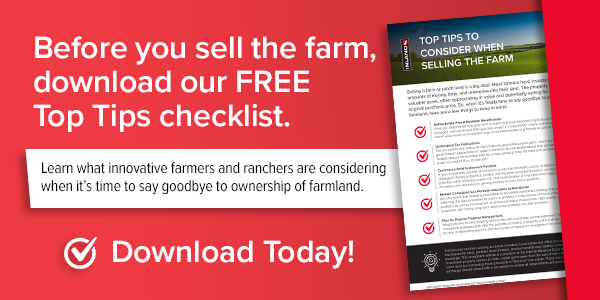Tax Concerns Remain at the Forefront for Farmers and Ranchers
Americans revere the farming and agriculture industry above all others according to recent Gallup polls,1 yet few U.S. citizens can grasp the range of challenges farmers face in running their business. From commodity market volatility to rising equipment costs to the ever-present fear of weather disasters, farmers face an array of issues unique to the profession.
And then there are taxes. While farmers finally received some tax relief when the Tax Cut and Jobs Act was passed in 2017, uncertainty about future tax policy remains a top concern. And for good reason.
Beneficial Provisions of the Tax Cut and Jobs Act
According to insights from farmbureau.org,2 The Tax Cuts and Jobs Act contains many new provisions that may help agriculture. Permanent provisions include:
- Sect. 179 Small Business Expensing Increased to $1 million
- Indefinite Carry Forward of Deductions Indexed for Inflation
- Depreciation for Farm Equipment Shortened from 7 to 5 Years.
- New Flat 21 percent Corporate Tax Rate
- Repeal of the Corporate Alternative Minimum Tax (AMT)
Temporary Provisions (and the need to make them permanent)
The Act also includes several temporary provisions that industry advocates argue could hurt farmers if not extended or made permanent.
- Reduced Pass-Through Tax Rates and Expanded Brackets: If not extended, higher tax rates will increase taxes on most farm and ranch businesses.
- New 20 percent Business Income Deduction (phase-out starts when taxable income exceeds $315,000/joint): Allowing the business income deduction to expire would expand the tax base of pass-through businesses, erasing much of the benefit of tax reform legislation.
- Unlimited Bonus Depreciation (Expensing): If not continued, farmers and ranchers will be unable to offset income with deductions for their business expenses. This is especially critical because like-kind exchanges for equipment and livestock are repealed.
- Doubled Estate Tax Exemption to $11 million per person/$22 million per couple: If the exemption is allowed to revert, more farms and ranches will be subject to estate taxes.
The Danger of Losing the Step-up
But, your greatest tax concern might be about a proposed policy that would overhaul the step-up basis in how estate beneficiaries receive assets. As part of the American Families Plan, the Biden administration had proposed eliminating the step-up in basis on unrealized gains for any inherited assets greater than $1 million (single tax filers) or $2 million (joint filers).
And while the proposal did not pass in 2021, it appears the Biden administration has kept it alive in its proposed 2023 budget.3 If passed, this change to existing tax law could have a devastating impact on your ability to transition your farm to your heirs. Quite simply, the tax burden for beneficiaries inheriting a farm that has been in a family for 60 years or longer could be insurmountable.
We encourage you to speak with an attorney and tax consultant as you consider future plans for your farm. As you’ve seen, tax policy can change often, and it’s essential to seek the trusted counsel of experts who stay on top of current and pending legislation.
We hope you have been enjoying our series of articles on selling your farm and our insights on the potential tax-advantages of using a 1031 exchange and Delaware Statutory Trust (DST) structure for your transaction.
If you missed any of our previous posts or would like to speak to a financial professional about the 1031 exchange and DST option, complete this contact form. A representative will call you within 24 hours.
1https://news.gallup.com/poll/319256/farming-rises-sports-tumbles-industry-ratings.aspx
2https://www.fb.org/issues/tax-reform/agriculture-and-tax-reform/tax-cut-and-jobs-act
3https://www.investopedia.com/biden-billionaires-minimum-tax-5223904
This communication is not intended as tax advice.
This website is neither an offer to sell nor a solicitation of an offer to buy any security which can be made only by a prospectus, or offering memorandum, which has been filed or registered with appropriate state and federal regulatory agencies, and sold only by broker dealers and registered investment advisors authorized to do so.
The Inland name and logo are registered trademarks being used under license. "Inland" refers to some or all of the entities that are part of The Inland Real Estate Group of Companies, Inc. which is comprised of a group of independent legal entities some of which may be affiliates, share some common ownership or have been sponsored and managed by such entities or subsidiaries thereof including the Inland Real Estate Investment Corporation (Inland Investments) and Inland Securities Corporation. Inland Securities Corporation, member FINRA/SIPC, is dealer manager and placement agent for programs sponsored by Inland Investments and Inland Private Capital, respectively. For more information on Inland Securities Corporation, visit FINRA BrokerCheck.

